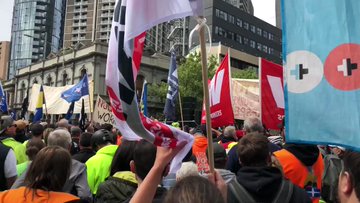Several streets in Melbourne's CBD were closed to traffic as tens of thousands of Victorians joined a union protest calling for greater increases to the minimum wage and better job security.
Key points:
Union says industrial relations system is broken, favours employers
Premier joins rally, criticises "imbalance" between corporate profits and pay rises
Federal employment minister warns against return to "mass union militancy"
Protests were held in capital cities across Australia — as well as several regional cities — as part of the Australian Council of Trade Unions' (ACTU) Change The Rules campaign.
The Melbourne march began at Trades Hall in Carlton and moved through the city centre and down Swanston Street before finishing at Flinders Street Station.
Some CBD streets were closed to traffic, and tram services down Swanston Street were detoured while the rally took place.
"I think it [Australia's industrial relations system] is broken," Construction, Forestry, Mining and Energy Union (CFMEU) Victorian assistant secretary Sean Reardon told ABC Radio Melbourne.
"And if it wasn't broke, we wouldn't be having these marches today."
"The pendulum has swung far too far in the way of the employers.
"You've got stagnant wage growth in most industries."
Sally McManus, the secretary of the ACTU, said wage growth is not keeping up with the cost of living.
Ms McManus said as many as 28,000 Australians are homeless despite working full-time.
"The minimum wage in our country is just over $37,000 a year," she said.
"That is not enough to support yourself, let alone supporting your partner and kids.
"It's not enough in our country towns. It's not enough in our big cities."
 PHOTO: Protesters marched from Victorian Trades Hall to Flinders Street Station. (ABC News: Danielle Bonica)
PHOTO: Protesters marched from Victorian Trades Hall to Flinders Street Station. (ABC News: Danielle Bonica)
Victorian Premier Daniel Andrews joined union leaders at the front of the rally and said those who attended were ordinary families.
"They want a better deal — they're entitled to that — so they can provide the best for their kids and they can have a better standard of living, greater opportunities than their parents have had," he said.
"There is a real imbalance between corporate profits and some of the pay rises, particularly in the private sector."
Cost of living and inequality concerns draw protesters
One of the protesters told the ABC she works in education, and is worried about job security and stagnating wages.
"Life gets more expensive and wages don't rise. We need to fight for that," Zaina said.
Meredith was at the rally to sing as part of a union choir.
"I love singing. I've always loved singing. I used to sing Methodist hymns in church and loved that but I'd much prefer to sing union songs," she said.
Meredith said the plight of workers had improved in many respects, and recalled how as a teacher she had been forced to give up her superannuation when she married.
"We have come a fair way in some ways but my observation is over the last few years we've gone backwards, in terms of wages, in terms of rights, in terms of inequality, in the gap between those who have a lot and those who have nothing very much."
Kate said she had turned out to remember workers who had died on the job.
"I think it's disgusting that there are so many workplace deaths each year and … I think it's disgusting that we have to keep fighting to make sure people are safe at work," she said.
 PHOTO: Kate (left) and Nellie were among the participants in the Melbourne rally. (ABC News: Danielle Bonica)
PHOTO: Kate (left) and Nellie were among the participants in the Melbourne rally. (ABC News: Danielle Bonica)
Nellie said she was at the rally to stand up for hospitality workers, who she said are under-represented in the union movement because they are often young and not well-informed about their rights.
"I'm here for the all people working in hospitality, all of my friends who are getting ripped off and underpaid," she said.
Industry warns politicians against 'reckless' changes
Minister for Jobs and Industrial Relations, Kelly O'Dwyer, warned in a newspaper column that the rally was a "glimpse of the bleak industrial relations landscape future" Australia faces if there is a change of government at next year's federal election.
"What do they want?" Ms O'Dwyer asked of the protesters.
"They want there to be no rules, no regulator and no check on their power.
"The ACTU wants a return to the dark days of mass union militancy, it wants workplace division and disruption, it wants the ability to flagrantly break any industrial laws it doesn't like."
 PHOTO: Ms O'Dwyer has used a newspaper column to warn of a "return to the dark days of mass union militancy". (ABC News: Marco Catalano)
PHOTO: Ms O'Dwyer has used a newspaper column to warn of a "return to the dark days of mass union militancy". (ABC News: Marco Catalano)
The Australian Industry Group said the rallies would disrupt business and leave employees out of pocket, and called on all sides of politics to reject "the ACTU's self-interested campaign".
"The rallies are aimed at convincing the Labor Party to commit to making sweeping changes to the Fair Work Act if elected, to give the unions a lot more power," the group's chief executive, Innes Willox, said.
"Senior union leaders have expressed the view that they see no problem in breaking laws that they do not agree with. This strikes at the heart of our democracy and the rule of law.
"Given this attitude of union leaders, it would be reckless to give unions even more power over the economy."








.jpg)
.jpg)



0 comments:
Post a Comment